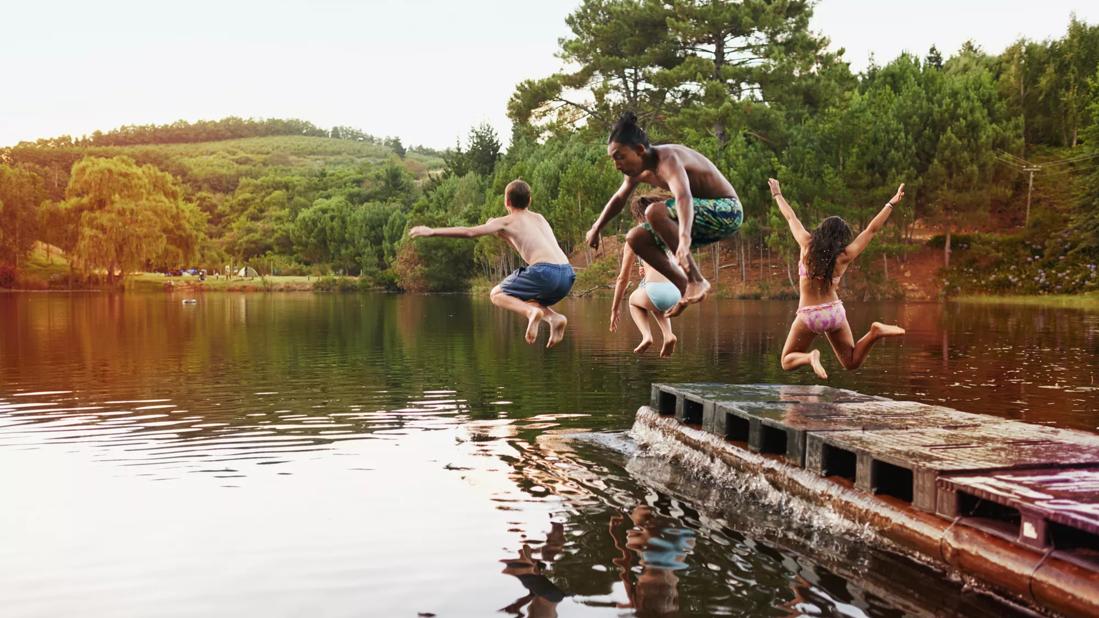Advertisement
How to help them trade screen time for green time

It’s not unusual to see a 3-year-old expertly operate an iPad or smartphone. Many kids seem more comfortable indoors in front of a screen rather than outside at a park or playground.
Advertisement
Cleveland Clinic is a non-profit academic medical center. Advertising on our site helps support our mission. We do not endorse non-Cleveland Clinic products or services. Policy
How can you foster a love of the outdoors in kids despite the lure of technology?
Here, pediatrician Gregory Weaver, MD, MPH, explains how to encourage kids of all ages to take breaks from their electronics and play outside — without nagging or forcing things:
Two- to 3-year-olds are fearless explorers and probably the easiest group to get outside. They yearn to touch, smell (and eat) their environment.
By ages 3 and 4, kids are “little scientists,” running experiments to help understand the world around them, Dr. Weaver says.
“When parents ask me what the best toy is for their 2-year-old, I say, ‘You.’ If you interact with your child and show a personal interest in the natural world, your child will reflect your interest,” he says.
It’s best not to present going outside as a chore or as a way to get exercise. Let kids see it as an exciting opportunity to discover new sights, smells and sounds in a beautiful, exciting place.
“When we take walks with our young daughters, my wife and I point out new birds or animals, or talk about the colors of the flowers we see along the way,” says Dr. Weaver.
As kids move into the early school years, they’re likely less curious about getting outdoors just for the sake of exploring the world.
Here, the best tactic is to find things they like to do outside, and work from there. For instance, most kids love swimming, so that’s almost always a hit. Sports often serve as a good catalyst for breaking away from screens, too.
Look for exercise that both you and your kids enjoy. (If it feels like a chore, you’ll all find ways to avoid it.)
“Find things kids are excited about. Then build a natural experience around them, so it doesn’t feel as if they’re being forced to eat their vegetables,” says Dr. Weaver.
If kids are slightly older and really object to playing outside — or if you live in an area with little green space — look for a zoo, aquarium, botanical garden or other kind of natural space to visit.
Even many art museums — which often have free admission days — have outdoor areas or atriums for children to explore, he says.
Electronic devices and video games are engineered to capture — and hold — your attention. And no one is more susceptible than teenagers.
So during the teen years, you may have to mandate outdoor time.
Dr. Weaver recommends creating a structure but allowing your teens to make choices within it.
Advertisement
For example, give them a plan for the week, but let them choose their “no screens allowed” times or days. Then offer a few outdoor options for those times.
“Sometimes you have to say, ‘enough is enough,’ and deal with the griping. But the alternative must be fun,” he says. “And you have to allow kids to act independently within the structure you set up.”
Even when kids are skeptical at first, they’ll likely come around if they have a hand in planning their outdoor time.
An important note about teens: Be sure you’re living by the same rules you give them. If you ask them to put their screens away, then turn yours off, too. “It’s not fair to expect something out of a teen that you aren’t willing to do yourself,” says Dr. Weaver.
The bottom line? Your whole family will benefit from less screen time and more green time.
Advertisement
Learn more about our editorial process.
Advertisement

Integrating coping skills into your teen’s daily routine helps turn self-care into a lifelong healthy habit

Yes, it’s safe for babies starting at about 9 months old and can help clear nasal mucus

Local LGBT centers, online directories, visual cues and gender-affirming care or non-discrimination policies can all be helpful resources and cues

From newborn through teen years, your child’s sleep needs will change

Early weight gain can lead to health issues like heart disease, diabetes and cancer

Current research suggests 1 out of every 36 children in the U.S. has ASD — and that’s probably an undercount

For starters, autism spectrum disorder isn’t a disease

Both terms have been replaced by autism spectrum disorder (ASD)

Focus on your body’s metabolic set point by eating healthy foods, making exercise a part of your routine and reducing stress

PFAS chemicals may make life easier — but they aren’t always so easy on the human body

While there’s little risk in trying this hair care treatment, there isn’t much science to back up the claims